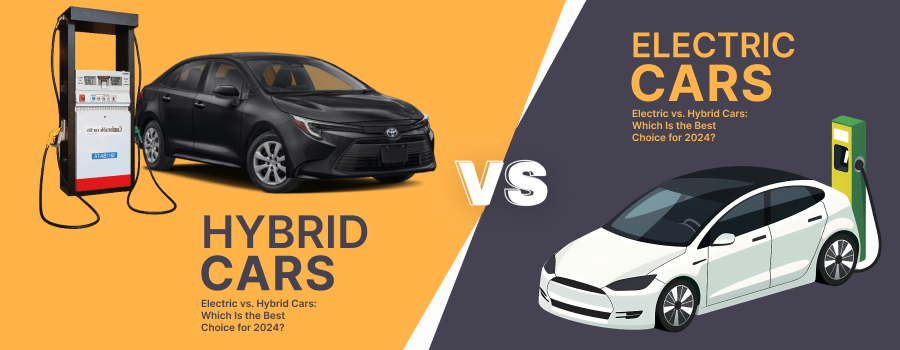Posted on: Aug 20, 2024
Estimated reading time: 0 minutes
Electric vs. Hybrid Cars: Which Is the Best Choice for 2024?

Selecting the right car for 2024 can be difficult due to rising environmental awareness and advances in automotive technology.
In this blog, we compare electric vs. hybrid cars and see their advantages and disadvantages to make your decision informed.
Let’s first understand electric and hybrid cars:
Electric vehicles (EVs), also known as EVs, run solely on electricity. Electric motors and battery packs are utilized to drive the vehicle, necessitating charging from external power sources.
The Nissan Leaf and the Tesla Model 3 are two well-known examples.
Hybrid Vehicles: Hybrids integrate a traditional internal combustion engine (ICE) with an electric motor, resulting in enhanced fuel efficiency and lower emissions in comparison to conventional gasoline-powered vehicles.
It can be further categorized too:
Full Hybrid: These cars can operate solely on an electric motor, solely on the gasoline engine, or in combination with both. Example: Toyota Prius.
Plug-in Hybrid: These hybrids have larger batteries that can be charged via an external power source, allowing for a longer all-electric range. Example: Mitsubishi Outlander PHEV.
Mild Hybrids: These vehicles use an electric motor to assist the gasoline engine, improving fuel efficiency but not allowing for all-electric driving. Example: Honda Insight.
Electric vehicles: Pros and Cons
Pros:
Zero Emission: Since EVs do not produce any emissions from their tailpipes, they are an environmentally friendly option that contributes to cleaner air.
Lower Operation Costs: Electricity is generally cheaper than gasoline, and EVs have fewer moving parts, leading to lower maintenance costs.
Incentives and Rebates: Many governments offer tax credits and rebates for EV purchases, which can offset the higher upfront cost.
Quite Operations: EVs operate silently, providing a quieter and smoother driving experience.
Cons:
Limited Range: Even with their improvements, many EVs may still not have enough range to go on lengthy trips between charges.
Infrastructure for charging: While expanding, infrastructure for charging is not as pervasive as gas stations, which poses a risk in less populous areas.
Greater Initial Cost: EVs are frequently more expensive to buy than their gasoline-powered counterparts, though this can be lessened with incentives.
Charging Time: EVs require a longer time to fully charge than gasoline-powered vehicles, but fast chargers are becoming more widely available.
Hybrid Vehicles: Pros and Cons
Pros:
Enhanced Fuel Economy: Hybrid cars often have higher fuel economy than conventional gasoline-powered cars, which lowers fuel expenses overall.
Improved Fuel Efficiency: Hybrid cars often have higher fuel economy than conventional gasoline-powered cars, which lowers fuel expenses overall.
Extended Range: Using a combination of electric and gasoline power, hybrid vehicles can travel farther than most EVs, which makes them appropriate for longer excursions.
No need for Charging Infrastructure: Since hybrids produce their electricity via regenerative braking and the gasoline engine, they do not require external charging.
Cons:
Complexity: The mechanical complexity of hybrids is increased by the combination of an electric motor and gasoline engine, which may result in increased maintenance expenses.
Minimal Environmental Impact: Although hybrid vehicles are greener than conventional vehicles, they lack the cleanliness of fully electric vehicles.
Greater Initial Cost: Compared to their conventional gasoline counterparts, hybrids can be more expensive at first, but usually not as much as EVs.
Reduced Electric-Only Driving Range: In comparison to full EVs, even plug-in hybrids have a smaller electric-only driving range.
So, which is the best choice for 2024?
First of all, what to buy from these two vehicles depends on your needs, driving habits, and the way you use them.
For city commuters: Due to its zero emissions and cheaper running costs, an electric vehicle may be the best option if you drive primarily in cities and have access to charging infrastructure.
For budget-conscious consumers: Consider the total cost of ownership, including purchase price, fuel, and maintenance. In the short term, hybrids might be more cost-effective, but with available incentives, EVs might save money over time.
For individuals who often undertake long journeys, a hybrid vehicle may be a more appropriate choice, as it offers an extended range and the convenience of refueling, alleviating concerns regarding charging infrastructure.
For Environment Conscious Buyers: When it comes to environmentally conscious driving, electric vehicles (EVs) set the standard with their zero tailpipe emissions.
Conclusion:
In conclusion, there are definite benefits and drawbacks to hybrid and electric cars.
Your decision regarding the best car for 2024 and beyond will be aided by evaluating your driving style, environmental goals, and budget.
As technological advancements progress, remaining updated on the latest innovations will enable you to make an informed decision that aligns with your requirements.